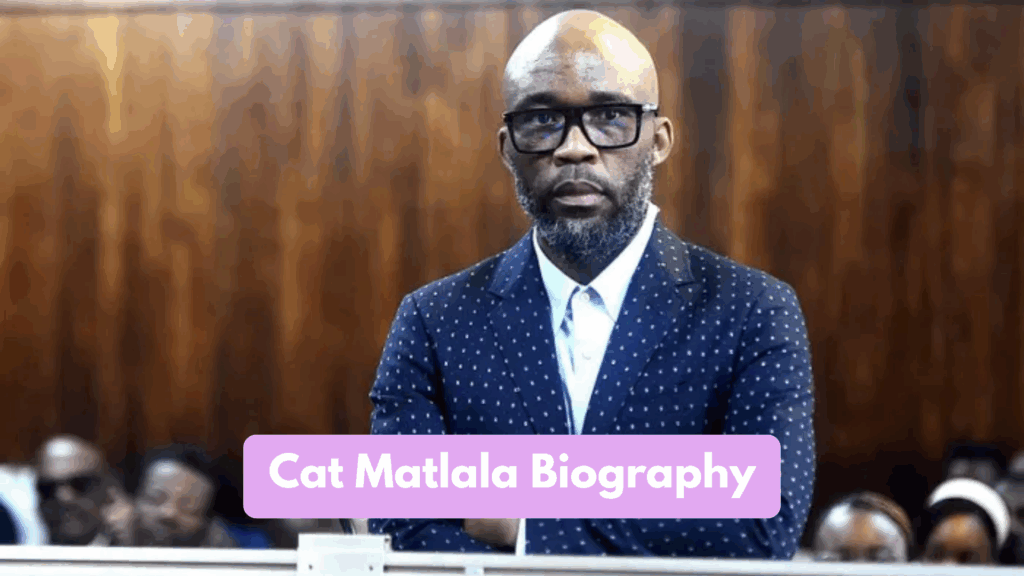Cat Matlala Biography: Wife, Age, Net Worth, News, Wikipedia, Tribe

Vusimuzi “Cat” Matlala (commonly referenced as Cat Matlala or Vusi Matlala) is a South African businessman who rose from the private-security sector to national prominence as a successful — and controversial — government contractor.
Over the past several years Matlala’s companies won multi-million-rand contracts supplying security, medical and procurement services to public institutions. Those successes, however, brought intense media and official scrutiny: allegations of tender irregularities, links to senior police officials, and criminal charges have made him a central figure in debates over corruption and “capture” in South Africa.
This detailed biography outlines Matlala’s background, business ventures, major contracts, allegations and legal troubles, and what his case signifies for public procurement and policing oversight.
Early life and background
Publicly available profiles of Matlala focus more on his business activities and legal controversies than on a detailed personal biography. He is widely reported to be from Gauteng province and made his initial career in private security and related services. Over time he expanded into companies offering medical support and supply-chain services connected to health facilities and law enforcement.
Like many contractors whose public profiles arise from tender activity rather than celebrity or political office, Matlala’s early years are sparsely documented in the media; instead, attention centers on how his firms entered the government procurement ecosystem.
Business interests and companies
Matlala is associated with a group of companies operating in security, health services and supply contracting. Media and public records link him to firms with names such as Medicare 24 Tshwane District, Cat VIP Protection, Black AK Trading & Suppliers and Cor Kabeng Trading & Suppliers, among others. Several of these companies provided services or supplies to state institutions and hospitals.
Investigations and reporting have noted patterns common to contested tender awards: relatively new vendor registrations, complex ownership lists, and relationships with influential intermediaries. Whether a business grows legitimately or through questionable channels, such patterns attract both auditors and watchdog journalists — and in Matlala’s case, they prompted formal probes.
The big contracts — how Cat rose into the spotlight
Matlala’s profile rose sharply after his companies were awarded significant government contracts. One high-profile example widely reported in national media was a R360 million contract awarded to Medicare 24 Tshwane District to provide occupational health and wellness services to members of the South African Police Service (SAPS). That contract — and others connected to hospital procurement — drew attention because of their size and because some were awarded with few competing bidders.
Investigative reports suggested links between Matlala’s businesses and supplies at hospitals such as Tembisa, where an earlier probe had flagged irregular awards. Whistleblowers and audits pointed to potential fronting, unusual supplier relationships, and payments that merited further investigation.
Allegations, investigations and the Madlanga Commission
From 2021 onward, Matlala’s name featured in several criminal and investigative storylines. The murder of whistleblower Babita Deokaran in 2021 — a case with wide-reaching implications for investigations into procurement fraud in Gauteng health facilities — kept scrutiny on companies linked to hospital contracts. Subsequent Special Investigating Unit (SIU) and law-enforcement attention traced several suppliers to firms associated with Matlala.
More recently Matlala became a focus of testimony at the Madlanga Commission of Inquiry into policing. Evidence and witness statements presented there alleged that Matlala had cultivated relationships with senior police officials and might have used influence to win or retain contracts. WhatsApp chats and other documents introduced during hearings were reported in the media as part of the public record that raised questions about his involvement in broader networks of corruption allegedly affecting SAPS procurement.
Criminal charges and court proceedings
In 2025 Matlala was arrested and charged in relation to serious offenses, including allegations of attempted murder connected to an attack on a former partner, as well as charges relating to fraud and money laundering. He has denied wrongdoing, but courts have repeatedly considered his case in high-profile bail hearings due to concerns raised by prosecutors about flight risk and the gravity of the allegations.
Public reports also described investigators asserting that Matlala had access to offshore assets, possibly fraudulent identity documents, and other factors that could influence bail decisions. Matlala’s legal team has challenged some of those assertions, and parts of the case remain before the courts, making the final legal outcome contingent on ongoing judicial processes.
Political and institutional implications
The Matlala story is not just about one businessman’s legal fate; it has broader implications for public trust in procurement, policing, and governance. High-value contracts awarded to companies with opaque ownership or close political ties create suspicion and feed narratives around state capture and institutional corruption. Testimony at commissions and in court has prompted public debate about how procurement is managed, who benefits from state spending, and whether oversight mechanisms are adequate.
For law-enforcement agencies and oversight bodies, the matter has been a stress test: can institutions uncover and remediate irregularities; can they protect whistleblowers; and can the justice system hold suspects accountable while safeguarding due process? The Matlala case continues to be monitored for the answers it provides.
Public reaction and media coverage
South African media outlets have aggressively reported on Matlala’s dealings, producing investigative series, timelines of contracts, and analysis of how companies linked to him secured work. Public reaction has been polarized: some view the case as emblematic of systemic problems in procurement and policing, while others warn against presuming guilt before the courts finish their work.
The coverage also fueled debates on regulation of private security companies, tighter vetting for high-value tenders, and the need for transparency in how contracts are awarded and performed.
FAQS
Q: Who is Cat Matlala?
A: Vusimuzi “Cat” Matlala is a South African businessman linked to private security, medical-services contracting and several companies that won government tenders. He has been at the center of media investigations and criminal probes.
Q: What are the main allegations against him?
A: Allegations include involvement in irregular tender awards, connections with senior police officials, money-laundering and, in criminal cases, charges related to an attempted murder. Many of these claims are contested in court.
Q: Has he been convicted?
A: As of the latest public reports, Matlala has faced criminal charges and court proceedings. Outcomes depend on ongoing trials and appeals; always check current court records or reputable news outlets for updates.
Q: Why did his R360 million police contract attract attention?
A: The contract was large, reportedly had few competing bidders, and later was flagged by investigators for possible irregularities — concerns that led to cancellation and further scrutiny.
Q: What is the Madlanga Commission and how is Matlala involved?
A: The Madlanga Commission is an inquiry into policing and state capture issues; witness testimony and evidence there have implicated Matlala in alleged networks influencing procurement and police operations.
Q: Where can I find reliable updates on this case?
A: Use reputable South African news outlets (e.g., eNCA, News24, Daily Maverick) and official court or SIU updates. Because legal cases evolve, check for the latest reports before drawing firm conclusions.
Conclusion
Vusimuzi “Cat” Matlala’s rise from private-security entrepreneur to a nationally scrutinized tenderpreneur shows both how lucrative state contracts can be and how dangerous opacity and influence can become for public institutions. The mixture of investigative journalism, judicial proceedings, and commission testimony around Matlala underscores larger questions facing South Africa: how to prevent irregular procurement, protect whistleblowers, and strengthen institutional oversight.
Matlala’s final legal and reputational fate will depend on court outcomes and the results of ongoing inquiries. Meanwhile, his case continues to be a focal point for discussions about accountability in procurement and the resilience of public institutions against corruption.


